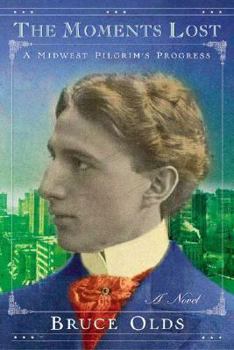The Moments Lost: A Midwest Pilgrim's Progress
Select Format
Select Condition 
Book Overview
Franklyn Shivs is a Wisconsin farm boy with a mind too vigorous, too full of desire, for a life on the farm. Leaving home as a young man, he heads south to turn-of-the-century Chicago, a city untamed... This description may be from another edition of this product.
Format:Hardcover
Language:English
ISBN:0374118213
ISBN13:9780374118211
Release Date:April 2007
Publisher:Farrar Straus Giroux
Length:468 Pages
Weight:1.72 lbs.
Dimensions:1.6" x 6.4" x 9.2"
Customer Reviews
4 ratings
Hard-hitting novel of one man's changes and revelations
Published by Thriftbooks.com User , 16 years ago
Fans of biography as well as novels will find intriguing and different THE MOMENTS LOST: A MIDWEST PILGRIM'S PROGRESS, a novel which charts the progress of one Franklyn Shives, who arrives in turn-of-the-century Chicago to become a newspaper reporter even as his bohemian lifestyle is becoming entangled in relationship issues. His assignment to cover the Wobblie-led 1913 copper mine strike in Michigan will further change his life and lead to betrayal and love lost in this hard-hitting novel of one man's changes and revelations, perfect for public libraries strong in literary novels.
Dos Passos Redux?
Published by Thriftbooks.com User , 16 years ago
The critics are comparing this latest offering from Olds to the best of John Dos Passos, in particular to the latter's USA Trilogy, a comparison that is not un-apt. Though I would suggest that Olds, in terms of both character portraiture and pure sentence-for-sentence writing, has it all over the older author. Typically, Olds's approach and style are not everyone's cup of tea. He seems to be a novelist who, because his aesthetic is so defiantly idiosyncratic, uncompromising, and extravagant, with each new book further divides critical opinion as to the ultimate merit of his work. The Moments Lost is not an "easy" read. One must bring one's fair share of patient intellect to the party, as well as a well-honed, heightened appreciation of the language AS language. But if the reader is willing to surrender, to "go with the shuffle and flow" that Olds so expertly creates here, he will, in the end, find himself more than richly rewarded, not only with an epic story passionately told, but with the lyrical excavation and disinterrment of a moment in our nation's history that until now has remained unjustly buried.
Bucking a Pilgrim's Progress
Published by Thriftbooks.com User , 16 years ago
This is the author's third novel and his most ambitious. It's a large, hell of a story, with a prose style equal to it. Any great novel takes the reader on a journey, and Olds offers a long, sweeping ride, with a historical view as seen from both ends of a telescope: far and near - from both past and present. A masterful rendering of not just a particular moment, but literally moments, moments lived, wasted, thrown away, and redeemed only, it might seem, through the blessings of the reader. Olds writes like a wise man. This could be accidental the way the talented occasionally manage, or, if we're all lucky, the author may indeed be gifted with some vision. He sees life the way it is, the only way it can be, which is a writer's primary duty. None of his characters are extraneous, all are fully realized, guided, often misguided, equally by their strengths and weaknesses. In this world virtue, sin, principle, hypocrisy, and folly, share top billing. It's like a Russian classic written by a rootin tootin literary modern cowboy, who's "always a little bit drunk," on mescal probably, the worm turning in his belly. Only four stars. Four and a half, had I too some mescal - but the flaws are few and may even serve the novel to remind the reader of the terrain he is crossing. Very worth your time.
Best or worst?
Published by Thriftbooks.com User , 17 years ago
Whether this is the best or the worst of the author's three novels to date is arguable, but it clearly is his most necessary, as it is, one presumes, the one closest to his heart. The impetus for its composition, as he reveals, originated in his personal ancestral history, and this is a fact that, for the reader, only amplifies and augments the multi-layered meanings of its colorfully compelling, cinematically-written story which is set in turn-of-the-2Oth-century Chicago and the Upper Peninsula of Michigan during the bloody copper mine strike of 1913-4. Once again, Olds's many writerly virtues--which, at moments, can also be his vices--are on high display here: the clamorous intelligence, the extensive vocabulary, the baroquely beautiful sentences, the lyrically interior voice, the graphically vivid concrete descriptions, the privileging of style over character and character over plot. While this clearly is the most ambitious of the author's novels, it also is his most conventionally structured, eschewing the multi-dimensional cubist/collage approach he employed to such devastating effect in "Raising Holy Hell" and "Bucking the Tiger," for a narrative of more linearity, continuity, and cohesion. Whether this indicates a newfound maturity or rather signifies a deliberate retreat from the author's trademark literary brinksmanship is a judgment each reader must make for him or her self. However, in this one's opinion, it not only works, but does so to brilliant, moving, and even profound effect.




